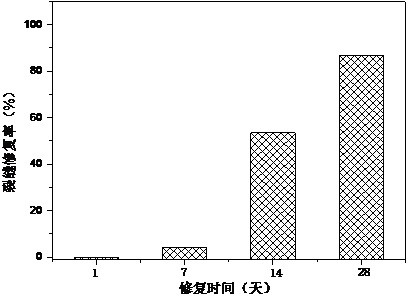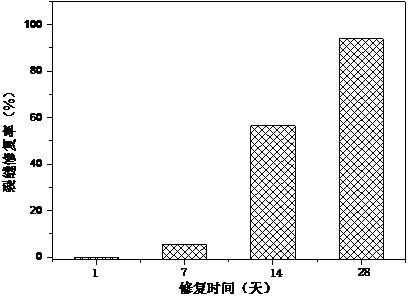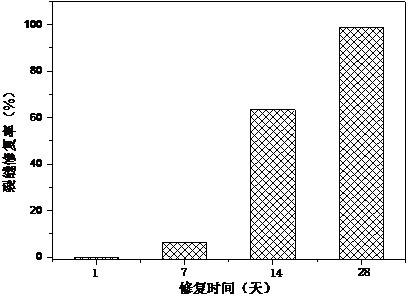A kind of preparation method and application of cement-based material additive
A technology for cement-based materials and additives, applied in chemical instruments and methods, calcium/strontium/barium compounds, inorganic chemistry, etc., can solve the problems of high cost, difficult hardening of liquid binders, and inability to put into practical engineering applications, etc. The effect of reducing dosage, improving engineering durability and service life, and improving mineralization efficiency
- Summary
- Abstract
- Description
- Claims
- Application Information
AI Technical Summary
Problems solved by technology
Method used
Image
Examples
Embodiment 1
[0034] (1) Calcium chloride solution and sodium bicarbonate solution are prepared in equal quantities, and organic template sodium dodecylsulfonate is added to the calcium chloride solution and sodium bicarbonate solution respectively in an amount of 1 g / L, and magnetic particles are added. Ferriferric oxide, the addition amount is 1g / L, the calcium chloride solution is slowly added dropwise to the sodium bicarbonate solution, the reaction temperature is 30°C, after standing for 2 hours, use centrifugal separation, wash the sediment with ethanol solution, and dry it Promptly obtain porous calcium carbonate microspheres;
[0035] (2) Inoculate Bacillus lysinus into the culture medium, the mass ratio of inoculum to culture medium is 1:100, the culture medium is deionized water 1000mL, peptone 8g, beef extract 2g, NaCl 1g, FeCl 2 0.4g, shake culture at constant temperature for 48 hours, add manganese chloride, a high-efficiency spore transformation agent, to the culture medium, ...
Embodiment 2
[0039] (1) Calcium chloride solution and sodium bicarbonate solution are prepared in equal quantities, and organic template sodium dodecylsulfonate is added to the calcium chloride solution and sodium bicarbonate solution respectively, in an amount of 10g / L, and magnetic particles are added. Ferriferric oxide, the addition amount is 5g / L, the calcium chloride solution is slowly added dropwise to the sodium bicarbonate solution, the reaction temperature is 30°C, after standing for 2 hours, centrifugal separation is used, and the ethanol solution is used to wash the sediment, and after drying Promptly obtain porous calcium carbonate microspheres;
[0040](2) Inoculate Bacillus lysinus into the culture medium, the mass ratio of inoculum to culture medium is 2:100, the culture medium is deionized water 1000mL, peptone 12g, beef extract 3g, NaCl 5g, FeCl 2 0.6g, shake culture at constant temperature for 48 hours, add manganese chloride, a high-efficiency spore transformation agent...
Embodiment 3
[0044] (1) Calcium chloride solution and sodium bicarbonate solution in the amount of substances such as preparation, add organic template sodium dodecylsulfonate to calcium chloride solution and sodium bicarbonate solution respectively, the addition amount is 5g / L, add magnetic particles Ferriferric oxide, the addition amount is 2g / L, the calcium chloride solution is slowly added dropwise to the sodium bicarbonate solution, the reaction temperature is 30°C, after standing for 2 hours, the sediment is washed by centrifugation and ethanol solution, and dried Promptly obtain porous calcium carbonate microspheres;
[0045] (2) Inoculate Bacillus lysinus into the medium, the mass ratio of inoculum to medium is 1:100, the medium is deionized water 1000mL, peptone 10g, beef extract 2.5g, NaCl 2g, FeCl 2 0.5g, shake culture at constant temperature for 48 hours, add manganese chloride, a high-efficiency spore transformation agent, to the culture medium, and the addition amount is 2g / ...
PUM
 Login to View More
Login to View More Abstract
Description
Claims
Application Information
 Login to View More
Login to View More - R&D
- Intellectual Property
- Life Sciences
- Materials
- Tech Scout
- Unparalleled Data Quality
- Higher Quality Content
- 60% Fewer Hallucinations
Browse by: Latest US Patents, China's latest patents, Technical Efficacy Thesaurus, Application Domain, Technology Topic, Popular Technical Reports.
© 2025 PatSnap. All rights reserved.Legal|Privacy policy|Modern Slavery Act Transparency Statement|Sitemap|About US| Contact US: help@patsnap.com



